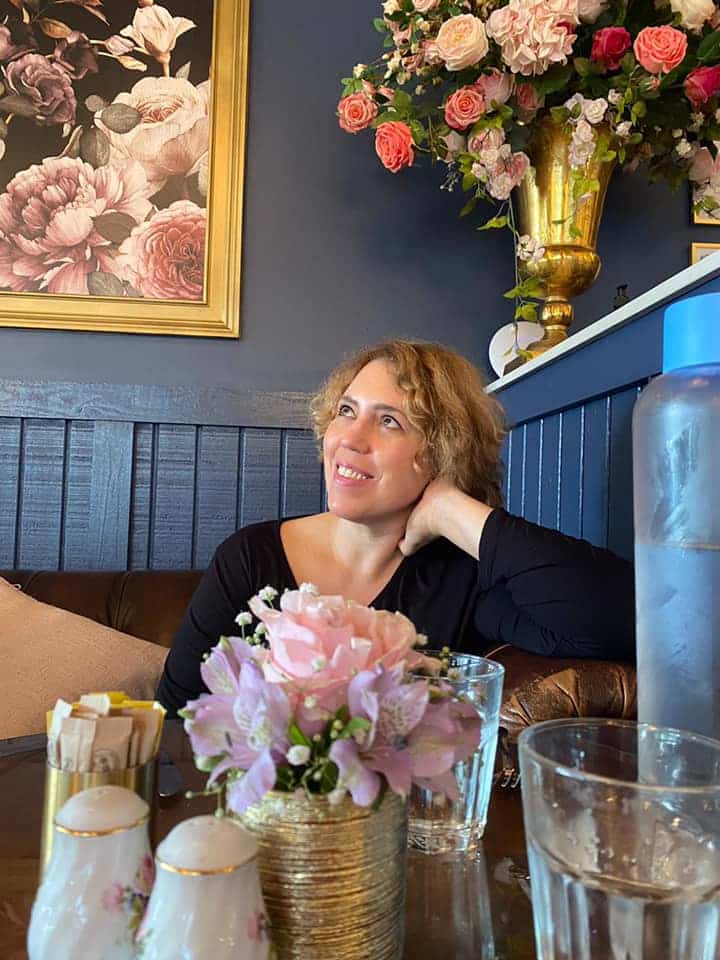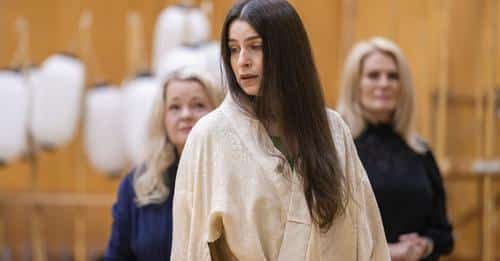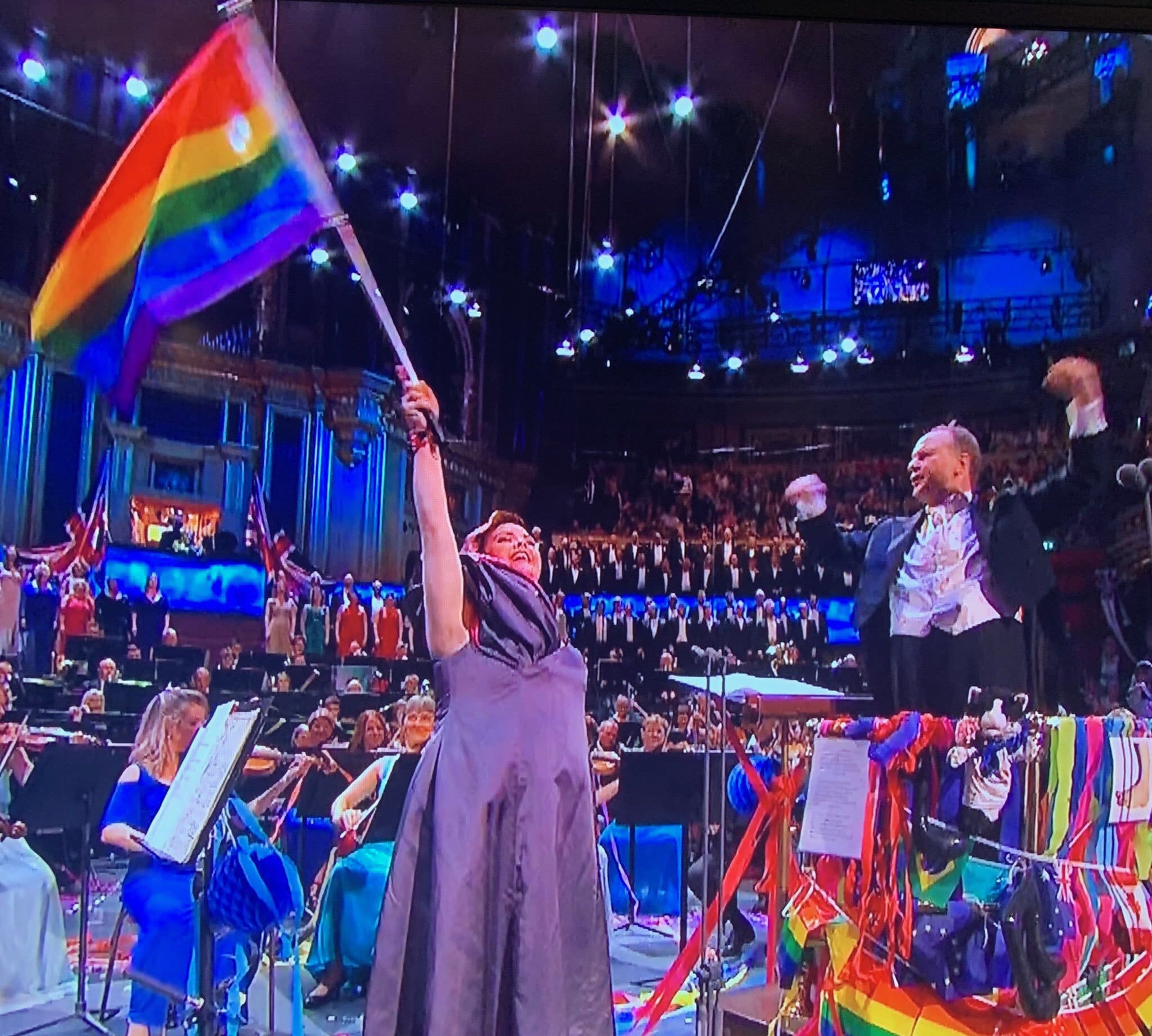Gabriela Montero: I made my concerto debut before I could read music
Daily Comfort ZoneThe Venezuelan-born pianist says she did everything in music by ear.
She made her debut at nine in Venezuela with a Haydn concerto that she learned by heart. It would be a year or more before she could read music on the page.
She reveals all to Met principal trumpet David Krauss. Listen here.






She once claimed she could improvise in a style without ever having heard music in that style. So I’m going to call utter BS on this one too. This lady is talented but clearly adores herself. Next!
I found her improvisations mediocre anyway…. and more than a touch narcissistic.
Of course she knew how to read notes at least somewhat. She was just quicker with her ear and memory and for a while could get away without expending the extra effort. There are some young students like that. Their strategy is to get you to play things for them. But they all eventually learn to read better with time.
To a certain extent the Suzuki violin method works that way — get the kid to start playing and learning the mechanics of bowing and fingering and making some sort of music before getting into the hard work of learning to read music. That is partly why the method is still an anathema to some musicians.
It’s also part of the success of the programme — by the time the students are settling to make music they already see what acquiring reading knowledge can bring them — much more of the same.
The principle is exactly the same as reading children stories before you teach them to read. They know what a world will open up to them once they have the skill for themselves.
This is a response to those who do not know Gabriela, from one who does.
And this is who I know. An artist who has spent her life trying to keep alive the spirit of classical music by merging performance, improvisation and composition, all the while using those disciplines to tell stories beyond herself.
A narcissist would have taken advantage of her Venezuelan connections and made the fortune offered to her by Jose Antonio Abreu in 2004. She would have put herself first. But she did the opposite. She rejected the easy money, she refused to be part of the circus of corruption, and instead used her abilities to build her own independent career with creativity and message her central motivations.
Inevitably, she is asked in interviews about her creative process. And, as in this interview, she always strips herself of merit by saying “I don’t understand it myself. I just get out of the way.” Her attitude is the very opposite of narcissism. It is one in which she consciously describes the removal of self – and, with it, the credit for her abilities – from the process. She admits to a lack of formal musical education as a child and to playing everything by ear until later not out of narcissism but because it is her biographical truth.
In our home, we have a huge collection of catalogued cassette tapes made by her mother that capture Gabriela as a small child, playing back songs she would hear around her, improvising in free form and just composing away to herself as though talking. These tapes reveal compositions in styles resembling other periods and genres, to which she had not been exposed, contributing to the mystery that might loosely be encapsulated in Jung’s idea of the universal consciousness.
It is this childhood history – and subsequent unconventional development – that led us both to want to find our more, which is why I sought out and introduced her to Dr. Charles Limb, a neurologist known for his studies on the biological substrates of creativity. He carried out an in-depth fMRI study to better understand this claim to “get out of the way”, since this has always been her personal testimony.
That study has been peer reviewed and published in a medical journal. You can find it in five seconds with a simple google search. Far from an exercise in narcissism, it is an attempt to understand the anomaly of spontaneous creativity that bestows itself randomly on certain brains and enables the beneficiary access to possibilities most of us can not imagine. The point of the study was to explain how creativity can occur in the absence of self-awareness and self-judgement, and the hope was that it would contribute to some intelligent conversations in the music community, while also helping Gabriela herself to understand the intricate neurological shifts between performing a memorized work one minute followed by an improvised work the next.
So, how base and vulgar we both find it, then, to read such spiteful and vapid commentary as provided above by NC and JB. How intellectually limited and petty. Is your interest not in music? Are you not challenged to dig deeper – as we have done – to find out more? How easy it is to fire off lazy, poisoned, ad hominem darts from the comfort of an armchair when you could do some research and find out that, far from “utter BS”, Gabriela is dedicated to contributing to a broader understanding of how the musical / creative mind works.
And this goes even deeper. One presumes, as NC does so glibly, that artists tend towards self-adoration. So the inclination is to fill in the gaps that lead to conclusions of narcissism. The problem is, you have stumbled on the least narcissistic artist you could ever find, one who opens her home to refugees, who carries out acts of life-saving kindness beyond the glare of any classical music blog, and one who always rejected the idea that her particular neurology implies a duty on her to perform in public. She has always struggled with the mandate to perform, that talent alone, once manifested, seems to impose from childhood. In her perfect world, she would spend most of her time composing, educating and helping her fellow Venezuelans in need, not performing. A less self-adoring person you would struggle to find, as you would struggle to find a single unkind word she has ever written about the professional competence of a fellow colleague.
These remarks, as so often on this blog, say far more about their authors than the targets of their attacks. And, sadly, they reveal that so many enemies of our art-form lie within, determined – for psychological reasons beyond my understanding – to besmirch those who are doing their best every day to keep alive the foundational values of creativity that gave us the music we all purport to love.
As for mediocrity? No defense required against such idiocy.
Footnote for V. Lind: Gabriela was not educated in El Sistema. Ever. Once and for all.
All very impressive & interesting, as an original way of playing live concerts. I still cannot really hear very interesting things in her improvisations. But yes, it is contributing to a more interesting concert performance format. Maybe more pianists should try such things and develop their musical talents more into the direction of composition, as was normal in the 19th century. But players should only present themselves as such if they have really things to offer of some real substance.
Then you either don’t know her work or don’t hear harmony, counterpoint, voicing, melody, sound, texture, architecture, not to mention the pianism required to bring these – to name but a few – elements together in real time. Listen to these three live improvised works from start to finish and tell me they are “mediocre”. Luckily there are recordings…
https://www.youtube.com/watch?v=3X60qjwOWKo
Or try this… A playlist containing 6 albums of original, fully improvised music, each album recorded in real time and without a single edit or post-production “correction”. Sit through the five hours and, again, tell me you have experienced “mediocrity”. It’s absurd that I even have to do this, but I can’t have you appoint yourself the public arbiter of “interesting” without resistance.
https://www.youtube.com/watch?v=lXwcIv9olKk&list=PLuYKwXxd1RfOJ32LaS5adbHRDQfjo2fC2
Imagine now that a jazz record reviewer is posting a list of jazz albums and saying wow, imagine that: This is all improvised. Every note! Well, of course it is.
A classical pianist doing fluent improvisations today is only remarkable in our present day context, but a series of Montero sessions 200 years ago would have been par for the course and expected of all musicians, good or otherwise. Everyone would have been improvising such sessions, similar to how all pianists carefully prepare and perform standard rep today.
We would never claim that well prepared Beethoven today is in any way remarkable, in and of itself. It is simply a minimum expectation and pianists would be pilloried if they were badly prepared. So, I would encourage us to not get too carried away and lose this important perspective.
I’m going to defend John here. He is a musician of vast knowledge, both theoretical and historical. John’s perspective is eminently valid. He is not disputing her talent. It is the deeper intrinsic quality of the music itself he is reacting to, not her general giftedness and pianistic skill, which is of a high order. Is he right? Well, you two can fight it out.
A Reinecke symphony is also very skillfully wrought and on its own stands very well. In fact, he was one of the most accomplished musicians of his time but one would find no shortage of people today saying Reinecke too created somewhat weak or mediocre music. But they are of course comparing him to competitors like Brahms. Are such judgements fair? I don’t know. Just bear in mind Montero has almost no competitors doing what she does in the classical field.